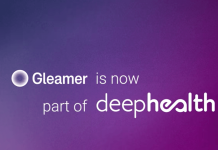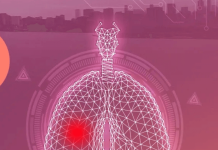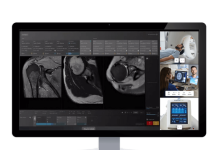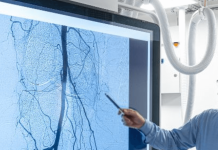Inner Cosmos recently reported interim 36-month outcomes from a study of its psychiatric brain-computer interface technology. The company evaluated the safety and feasibility of its neurostimulation-based BCI for treatment-resistant depression in three patients. Its minimally invasive neurotechnology device embeds in the top of the skull. It then transmits neurostimulation to treat cognitive disorders and mental health diseases.
Inner Cosmos likens its device to the way a pacemaker sits atop the heart, creating a “TMS to-go treatment.” It provides neurostimulation from the comfort of a patient’s home while psychiatrists can monitor patients remotely. They can also update treatments wirelessly to the implanted device.
Related: Hyalex Orthopaedics’ knee implant trial application gains FDA approval
The company says that, while most BCI systems to date focus on restoring physical or sensory function, it wants to address psychiatric intervention. This category targets dysfunction within large-scale brain networks responsible for emotional regulation, attention and cognitive flexibility.
Inner Cosmos says its trial evaluates safety and feasibility as primary outcomes, but also intends to collect efficacy data. It aims to demonstrate that its device can provide benefits equal to or better than transcranial magnetic stimulation (TMS) in a mobile form factor, eliminating the need for repeated visits to the clinic.
In a clinical study update written by Dr. Darin Dougherty, chief medical officer, the company classified its third patient as a “clinical responder.” The patient achieved a 54% improvement in depressive symptoms from baseline. That marked a 21% gain over their best prior TMS outcome.
“This milestone highlights continued momentum in the trial and reinforces the therapeutic potential of Inner Cosmos’ psychiatric brain-computer interface,” wrote Dougherty.
More on the Inner Cosmos BCI study
The company reported zero serious adverse events or safety issues to date in any of the three patients.
For patient one, the company reported a 41% improvement in depressive symptoms for a 27% gain over best prior TMS outcomes. In patient two, over 17 months, the subject achieved an 83% improvement from baseline. That marked a 60% gain over the best prior TMS outcome. This patient has remained in the remission range for over a year despite significant life stressors. According to Inner Cosmos, the patient elected to continue long-term use.
Finally, the third patient recorded their results after seven months of therapy, becoming a clinical responder.
“The clinical study is ongoing and outcomes will continue to be reported at regular intervals and submitted for peer-reviewed publication upon study completion,” Dougherty said. “These interim findings demonstrate meaningful, sustained symptom improvement in patients with long-standing treatment resistance, over the course of a total of 36 patient months. All three patients treated to date have surpassed their previous best TMS outcomes, reinforcing the potential of Inner Cosmos’ psychiatric brain-computer interface to transform care in this field.
“We remain committed to transparency in our development process and are deeply grateful to the patients and families participating in this important clinical research.”




